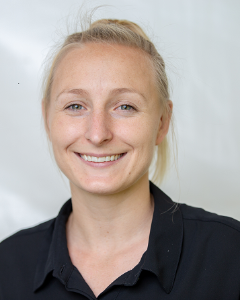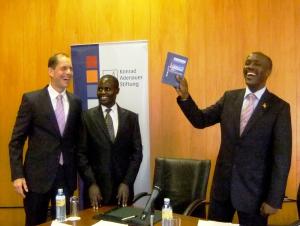Introduction
Freedom and responsibility – the realisation that those two principles go hand in hand is at the core of the concept of Social Market Economy. Since its initial political implementation in the early years of the Federal Republic of Germany, the Social Market Economy has turned out to be a meaningful and better alternative to the two extremes of centralist socialism and unbridled capitalism. The concept is not only the basis for the success story of the German economy. It also offers a useful approach for managing the global economy, particularly in light of the recent crisis, as well as ensuring meaningful social and economic policies in developing countries, including Uganda.
Social Market Economy offers an approach for an economic and social order that combines in an ideal way economic liberties, social responsibility and democratic rule of law. In this light, the promotion of democracy and rule of law and the promotion of meaningful social and economic policies are considered to be crucial and complementary elements in the work of the Konrad-Adenauer-Stiftung (KAS) worldwide.
The linkage of the principle of a free market with the principles of social balance and individual responsibility, based on the guiding concepts of subsidiarity and solidarity, offers important lessons for countries across the globe. As a German political foundation, the Konrad-Adenauer-Stiftung has a strong interest in sharing the positive experiences with the Social Market Economy in Germany. It is our conviction that its principles and features have a universal relevance and therefore deserve to be promoted through meaningful dialogue. Complying with the legacy of Konrad Adenauer, the foundation is convinced that social market economy is not only a suitable overall system of order for national development but also one of the most precious export articles of Germany.
Looking back at the success story of Social Market Economy over six decades, it is the aim of the Konrad-Adenauer-Stiftung raise awareness on the concept and its principles and promote some major features included in this concept as best practices, which can be applied even in the context of African developing countries and can help improving social and economic policies in a country like Uganda.
From 2011, the traditional focus in the work of the Konrad-Adenauer-Stiftung in Uganda – the promotion of democracy, rule of law and the participation of civil society – is being rounded off by a new component which is the promotion of the principles of Social Market Economy. However, the approach is based on the idea of dialoguing and exchanging experiences and best practices. We do not understand Social Market Economy as a completely predefined economic model that can simply be exported to or copied in Uganda. Instead, the main features and principles can offer interesting lessons and guidelines for policymakers and other stakeholders in Uganda. The Konrad-Adenauer-Stiftung aims to raise the general awareness about the concept of Social Market Economy and facilitate an ongoing dialogue about the relevance of its core principles in the Ugandan context.
In a first step, KAS Uganda has contracted a Ugandan economic expert to develop this paper. The aim of this paper is to set a starting point for subsequent discussions about Social Market Economy in the Ugandan context by providing a comprehensive assessment of the economic status quo and the current economic policies in Uganda as compared to the principles of Social Market Economy. These principles are thereby not understood as fixed prescriptions but rather as guidelines that can inspire a meaningful regime of social and economic policies in the country. The paper takes a critical look at current economic policies in Uganda with a particular focus on whether – implicitly or explicitly – certain social market economy principles are already being followed or not. It also discusses the general relevance and applicability of the same principles in the current Ugandan context.
The author, Dr. Evarist Twimukye, is an outstanding Ugandan economist and well-qualified expert on the matter. Among other tasks he has been analysing the Ugandan economy for the African Development Bank, the UN and the OECD. Until recently he was a Senior Research Fellow and the Head of the Department of Macro-economics at the Economic Policy Research Centre (EPRC), before moving to Southern Sudan, where he is now working as Chief Technical Advisor for the United Nations Development Programme (UNDP). I am confident that his paper will enrich the academic discourse as well as political discussions and will continue to trigger an important dialogue about meaningful social and economic policies in Uganda. If taken seriously, the universal lessons and guidelines that the concept of Social Market Economy provides can decisively boost Uganda’s preparedness for the economic and social challenges ahead.
You can download the whole report as pdf.
About this series
The series analyses developmental challenges in the political, social and economic sphere in Uganda. The editions examine hot topics of the daily political agenda and undertake a rigorous reality check. Reality Check is published in cooperation with Centre for Development Alternatives.
Order details
Editor
Konrad-Adenauer-Stiftung e. V.
ISBN
978 9970 207 03 6




